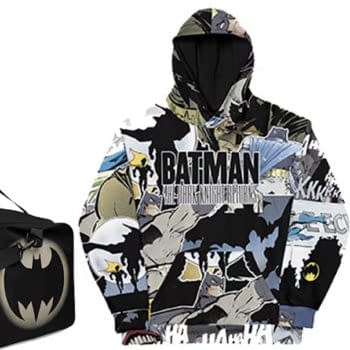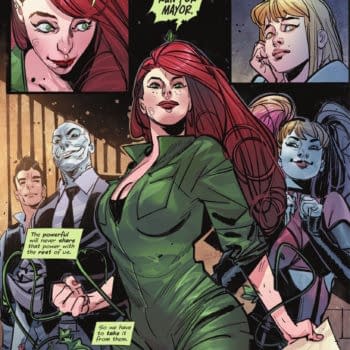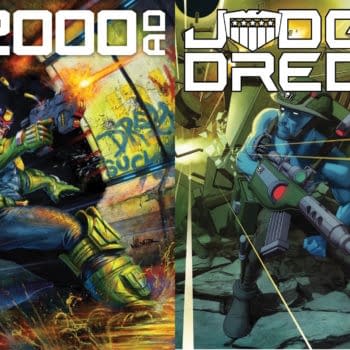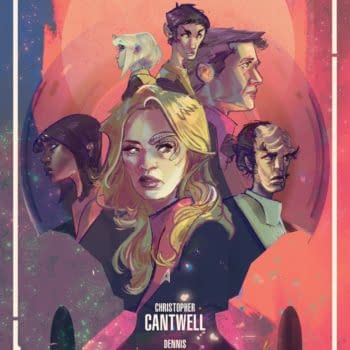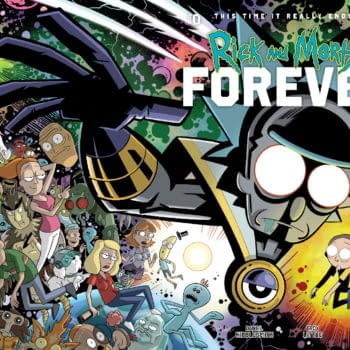Posted in: Comics, Recent Updates | Tagged: avatar press, Comics, Dark Gods, entertainment, german erramouspe, horror, hp lovecraft, image comics, Justin Jordan, luther strode, mythology
'The Universe Is Actively Out To Torture And Destroy Us' In Dark Gods – Justin Jordan In The Bleeding Cool Interview
Justin Jordan's new project, Dark Gods, was announced at SDCC for November release from Avatar Press, with a teaser image from artist German Erramouspe which made it clear that we are dealing with both a horror comic and something quite cosmic and thought-provoking. It turns out that things in Dark Gods are even more human-focused and more mind-bogglingly frightening in conception than readers might be expecting. Why are we surprised? This is Justin Jordan, who is consistently pushes the envelope in his writing across genres and publishers. He's not satisfied unless he challenges himself and the reader to think bigger, and his concern does often seem to be about human potential and accountability.
Take Luther Strode, for example, the Image series with Tradd Moore that shows us a kind of glorious and also an utterly horrifying portrait of what a person whose powers really extended well beyond normal humanity would be like. In many ways, Dark Gods flips that paradigm, and we see humanity's part in creating an outlet for chaos and destruction in the world without realizing it. For Jordan, that's actually tied very closely to our modernity, despite the fact that the title of the series might conjure primitive times in our minds. It's humanity's lack of awareness of their own role in enabling chaos that forms the crux of the events in Dark Gods, according to Jordan.
Living in our "separate" mental worlds, mainlined into our smartphones, we all might as well be Josh Resnick, our office-confined and soon-to-be bewildered protagonist in Dark Gods. Jordan's first issue takes us into what seems to be a horror-driven erruption of chaos right smack in the middle of ordinary modern life, but the principles Jordan suggests for the rest of the series are also set to take us far into the past and question the nature of good and evil along the way.
Justin Jordan spoke with us here at Bleeding Cool about the horrors of offices and smartphones, the nature of chaos, and why Dark Gods is, in fact, and "anti-Lovecraftian" story:
Hannah Means-Shannon: So, clearly and self-evidently mid-level office jobs and the office settings they happen in are a thing of horror with or without Dark Gods. Wherein lies the particular horror for you? Do you have experience with such environments?
Justin Jordan: Oddly, I haven't ever worked an office job as such. The closest I ever got was running a library program, but I'm pretty sure it doesn't count. For one thing, I spent most of my time nowhere near the office.
The initial setting there, though, both serves as a plot mechanic–Josh knows some stuff because of the job he has that puts in danger–and as a fairly subtle metaphor for one of the themes of the book, which is: the worlds we build for ourselves.
Offices like that are places people find themselves, but there aren't many people who would, you know, envision that as their future. They always strike me, as an outsider, as a little weird and a little surreal, so I figure it's good place for some horror.
HMS: There's a particular focus on cell-phones in the first issue as a platform for conveying important information and also as a kind of "message from the unknown" for our character Josh Resnick.
I was wondering how you feel about smart phones as this way of being constantly plugged in to information and something that directs our fates these days. If this story were set in an earlier time period, what kind of equivalent modes would be used to reach people and convey this level of immediacy?
JJ: Smartphones have actually fundamentally changed how a lot of horror is told. I mean, that you can contact your friends and the police changes a lot of, say, slasher movies, even though Dark Gods isn't that.
Likewise, everyone has cameras now so, you know, if there's a ghost or demon about, the odds are pretty good that someone is going to be recording it, or at least trying to. And you can see this effect in movies like Paranormal Activities.
I don't have a smartphone. I don't have a cell phone at all, actually. This isn't JUST because I'm a cave dwelling troglodyte; I live in an area with no coverage and work at home, so I don't need one.
So that again, makes me kind of an outsider, and probably changes my perspective on it. And what I think is that those smartphones, in a way, are making us more and less connected at the same time.
On one hand, people can be connected with their friends and family all the time. In that sense, everyone is constantly connected, constantly sharing their lives with each other in a way that flat out didn't exist ten years ago.
On the other hand, it can disconnect us from people we don't know, and some of those we do. You can see a dinner where people are physically together but their attention is on their phones, on the people that aren't there. Or Candy Crush.
And likewise, I've gone to concerts and seen people filming virtually the whole thing on their phones. And because, apparently, I've turned into a crusty old man, I wonder why they can't just be there while they're there. They're experiencing life, but they're doing so through a tiny screen on a phone.
Which loops around to that theme of the worlds we create for ourselves, which is relevant to how the Dark Gods are getting back into the world and why they were forced out to begin with.
There flat out isn't anything that would have been an equivalent if the story were set in another time period. What would come close, and this comes up in the story itself, is when humanity was largely disconnected, without the large common cultures. Those villages would have the same kind of "consensus reality" you get with phones.
Or I am totally full of shit.

HMS: During the course of the first issue of Dark Gods, it looks like we will see stories set in different time periods and different countries conveyed in art style appropriate to that time and place. Could you comment on wanting that element of authenticity for storytelling in the comic and what you hope to convey by having it?
JJ: Mostly, because it's cool.
I mean, we're pretty generally familiar, for whatever reason, with Greek and Roman mythology, with Norse running second. But there are thousands of other mythos out there, and they are really interesting. For one thing, they come from cultures that value different things than American culture, and think differently about the world.
Stylistically, I wanted to try mimic what would be appropriate for the place and time for above-mentioned coolness, but also because I think it gives a sense of scale to things. You can see how these events are woven into history and the world.
HMS: Ok—the Dark Gods of the title. These are things from the primal chaos before the earth even came into being, it seems. What is the role of chaos in keeping the cosmos in motion, in your opinion? Is it somehow "evil" or just something to be resisted, integrated, or better understood?
JJ: Good question.
The primordial chaos in Dark Gods was what came before our universe. It's fundamentally incomprehensible to human minds, which, frankly, is probably true of what came before the universe in the real world. It's like trying to wrap your brain around time as a dimension. You can only intellectually understand that kind of stuff.
But chaos…well, the thing is, chaos is a human construct. Chaos is only chaos because we don't have, and can't have, all the information. If you had complete knowledge of the pre-existing rules and conditions, nothing would be classified as chaos, anymore than the shape of a rose is chaos.
Now, the premise in the world that Dark Gods takes place in is that the universe is shaped, at least partly, by human minds. We believe in order, and that order becomes imposed on the universe, and that keeps the creatures of chaos out. They can't exist here, not as they are.
So they need to erode our combined beliefs. If everyone believes something different, then reality becomes flexible enough to let them in, to give them a space to occupy. Unfortunately, we humans like order. Love order.
The Dark Gods aren't precisely evil by nature. But things that create chaos empower them, and so they certainly seem evil here, at least most of the time. And I think it's pretty reasonable to ask: Is there a difference between that and actually being evil?
HMS: Are we in Lovecraft territory here? Are you a Lovecraftian-influenced writer when it comes to horror stories?
JJ: I think it'd be hard to write horror and not be influenced by Lovecraft, honestly. He's pretty fundamental to what horror has become in modern pop culture. And there's definitely some of Lovecraft here, in the sense that the universe is darker than we think. Weirder than we think.
But at the same time, Dark Gods is kind of anti-Lovecraftian. The real horror in Lovecraft's work isn't tentacles and cosmic entities. The real horror is that we don't matter. The universe is vast and cold and utterly indifferent to humanity. Not even indifferent, unaware.
I think that's the essence of the Lovecraftian variety of cosmic horror. Dark Gods goes with the opposite idea: humans are hugely important, and the universe is actively out to torture and destroy us. It's a malevolent reality.
And I don't think that's incompatible with the idea that these things aren't precisely evil in the sense that humans would understand. Our suffering helps them, so they want us to suffer.
[Contributing art by German Nobile]
HMS: In your work on God is Dead, "The Great God Pan", you touch on this idea a little, and here more fully, I think—that we "allow" these gods into our lives due to some kind of need in humanity. What is the nature of that need and why do you think human beings have historically created something as a projection of our fears to be revered and dreaded?
JJ: Humans need explanations. We, as a species and generally as individuals, do not deal well with uncertainty. We are always looking for cause and effect, and if we can't find it, I think we make it.
I think gods in mythology are mostly attempts to give the world a shape and structure, to give us a sense that we understand the world and know what will happen next. Even if the gods are terrible and monstrous, we like the sense of understanding.
And, you know, gods aren't something you can bargain with, or influence. You can't appease a drought or reason with a thunderstorm. But by ascribing them human characteristics, they become something we feel we can control.
HMS: When you're dealing with a story about primal gods, things that are essentially "before" ideas of good and evil even exist, how do you come up with protagonists and antagonists in a way that readers can identify with? Is it just about siding with the characters who want to stay "human" and survive?
JJ: Heh, that's a hard question to answer without getting epically spoilery.
F. Paul Wilson has a lot of novels that deal with a battle between two vast supernatural forces called The Ally and The Otherness. The Otherness is definitely evil, but the Ally isn't actually good, just on a side that's better for us.
What Wilson does is filter this through his human characters, and that's pretty much the tack I'm taking. Resnick, the protagonist, is a good guy and hopeful a relatable guy. And one thing he's desperately trying to do is find the right side.
HMS: Can you tell us about how you developed the character of Josh Resnick and how you see him as a modern guy? How is he similar or different to other characters we'll encounter in this comic series?
JJ: Josh is, as mentioned above, meant to be a fairly regular and relatable guy. I think he's an interesting and funny guy, but he's probably the most normal of the characters we meet in the first arc, anyway. He should be recognizable to most people.
Pretty much everyone else Josh meets is either a cultist or a former cultist, and so their psychologies are… different. Combine that with a fairly fantastic concept, and I figure we needed a character whose head readers could get inside.

HMS: Conspiracy theories that span the scope of human history seem to be the natural stuff of horror stories—things that might be shaping our lives without us realizing it, and therefore are tremendously disempowering. Is Dark Gods about reminding us that we know less than we think we know or have less power than we think we have?
JJ: Actually I think it's a combination of us knowing less than we think we do and having more power than we realize. At least within the universe of Dark Gods. What we believe matters; believing the universe is a certain way, if enough people believe it, makes the world that way.
But now, we don't have the kind of monolithic belief systems we once did. Everyone has their own little world, and that's allowing the Dark Gods to find ways back in.
As that applies to the real world, I think there's horror in both concepts. We don't understand the universe very well–as Douglas Adams said, the one thing humans can't afford is a sense of scale.
The universe is vast and what we DO know about is barely within the realm of comprehension. I'd say you really can't understand the size and age of the universe in any real way; we simply lack any meaningful reference for things that large.
You can add on top of that all the things we don't know. And not just things we don't know, but things we don't know we don't know. Our senses give us a sliver of the universe, but there are lots of things, maybe an infinite number of things, we don't know and can't know.
Which is fairly horrifying, and that IS a Lovecraftian idea, I think. That sense of dread you can get if you take that all in.
At the same time, I think we're all capable of a lot more than we give ourselves credit for, and there's a certain horror in realizing it. At getting to a point where you can look back at life and see all the things you could have done but didn't let yourself do.
That said, I may have caught a case of the old.
HMS: What, deep down, made you want to work on this project as opposed to other stories you could have worked on instead?
JJ: Money.
Cold hard cash.
No, actually, the idea behind Dark Gods is actually something I'd been tinkering with for years. Originally, the concept was called The Godkillers, a title I've since recycled. But the ideas in it interested me.
The thing about creative stuff is that what gets worked on when tends to be at least partly dictated by stuff you, the creator, can't control. Getting a publisher, getting an artist, having time in the schedule.
In this case, it was that the chance to work on something I wanted to work on came up at a time when I could work on it, so I did. And yeah, having those kinds of opportunities come about when you're a creator is pretty awesome.
Dark Gods #1 is currently listed in Previews with pre-order code: SEP141034













